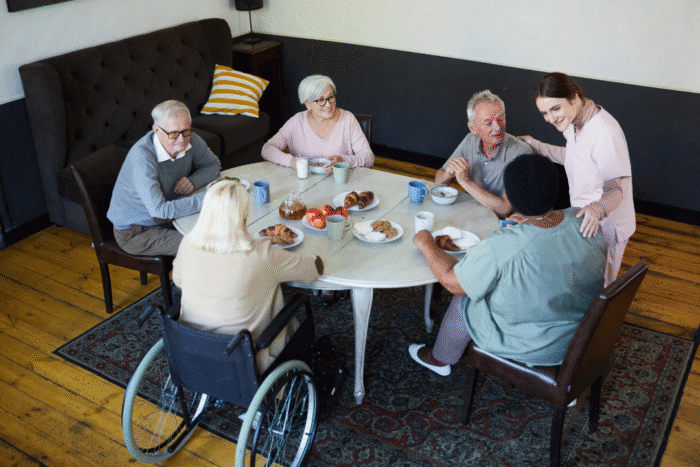Dealing with Relocation Stress Syndrome in Seniors

Moving to a new environment, especially in the golden years, can be overwhelming. Senior citizens are particularly susceptible to feeling disoriented, anxious, and depressed during such transitions. This phenomenon is referred to as Relocation Stress Syndrome (RSS), a condition that can severely impact their emotional and physical health.
What is Relocation Stress Syndrome?
Relocation Stress Syndrome, also known as transfer trauma, is a formal nursing diagnosis characterized by a combination of physiologic and psychological disturbances resulting from transferring a person from one environment to another.
Signs and Symptoms
Common symptoms include anxiety, confusion, depression, and loneliness. These might be accompanied by physical manifestations such as insomnia, changes in appetite, and even cognitive impairments.
Why Seniors Are at Risk
Emotional Attachments
Seniors have spent a lifetime creating memories in their homes. Leaving behind familiar surroundings, cherished possessions, and long-time neighbors can trigger emotional distress.
Declining Health
Many seniors move because of health issues. The combination of adjusting to a new place while dealing with health challenges can compound stress.
Fear of the Unknown
Uncertainty about a new environment, unfamiliar faces, and the potential loss of independence can be daunting for seniors, making them more susceptible to RSS.
Expert Recommendations from The Valencia Home
At The Valencia Home by MD Senior Living in Scottsdale, AZ, our experience with senior care has made us experts in addressing and mitigating the risks associated with RSS. Here are some tailored recommendations:
Open Conversations
Initiate discussions early. Engage seniors in conversations about their concerns, wishes, and fears. Being heard can be therapeutic and provide clarity for seniors and their caregivers.
Familiarize Before the Move
Visit the new place multiple times before moving. Familiarity can help in reducing anxiety. Consider taking pictures of the new space, reviewing them with your loved one, and discussing where personal items will be placed.
Personalize the New Space
Make the new place feel like home. Bringing favorite items, photographs, and mementos can create a sense of belonging and comfort.
The Role of Care Facilities
Staff Training
Staff in care facilities must be trained in recognizing and addressing RSS. Compassionate care and patience can make all the difference.
Welcoming Environment
A welcoming and inclusive environment fosters a sense of security. Activities that encourage social interaction can help in assimilating seniors into their new community.
Maintaining Routine
A consistent routine can be comforting. Ensure that meal times, activity schedules, and other daily tasks remain as consistent as possible to provide a sense of normalcy.
Understanding the nuances of Relocation Stress Syndrome and its implications for senior well-being is paramount. As seniors move by choice or necessity, it becomes our collective responsibility to ensure their transition is smooth, stress-free, and conducive to their overall well-being. With proper knowledge, patience, and a little bit of effort, we can greatly reduce the impact of RSS and provide our seniors with the care and understanding they deserve.

Proactive Measures for Families
Involvement in the Decision
While making the decision to move, involve the senior in the process. Their input and feelings about the move are paramount. When they feel part of the decision, it reduces feelings of helplessness.
Transition Period
Consider a transition period where the senior can spend a few hours or even days in their new home before the final move. This helps in gradual adjustment and lessens the shock of sudden change.
Encourage Social Activities
Once relocated, encourage your loved one to participate in social activities. Interaction can alleviate feelings of isolation and help them create new bonds.
The Importance of Mental Health
Seeking Professional Help
If you notice persistent signs of RSS, consider seeking help from a professional. Psychologists or counselors can provide coping mechanisms and therapeutic interventions.
Establishing Trust
It’s essential to build trust with seniors undergoing relocation stress. Reassure them about their safety and the benefits of the move, emphasizing the positive aspects of their new environment.
Continuous Communication
Keeping the lines of communication open is vital. Regularly check in, listen to their concerns, and offer emotional support whenever necessary.
The Valencia Home’s Dedication to Seniors
At The Valencia Home by MD Senior Living in Scottsdale, AZ, we recognize the unique challenges that come with senior relocation. Our commitment goes beyond providing physical care; we strive to offer an emotionally supportive environment.
Personalized Care Plans
We understand that every senior is unique. Hence, we craft personalized care plans addressing each individual’s needs, ensuring they feel valued and at home.
Engaging Activities
Our facility regularly hosts engaging activities tailored for seniors, ensuring they remain mentally and socially active. These activities not only enhance their quality of life but also foster community bonding.
Continuous Training
Our staff undergoes regular training sessions to stay updated on best practices for senior care, ensuring every resident receives the care they deserve.
Conclusion
Relocating, especially in the golden years, isn’t just about a change in physical surroundings. It’s about navigating through emotions, memories, and adjustments. But with the right approach, understanding, and support, Relocation Stress Syndrome can be managed, ensuring our seniors transition with ease and comfort.
If you or a loved one are navigating through the challenges of relocation, know that you’re not alone. At The Valencia Home by MD Senior Living, we’re here to guide and support. Feel free to reach out to us at 480-605-4002. Your well-being is our utmost priority.






Leave a Comment